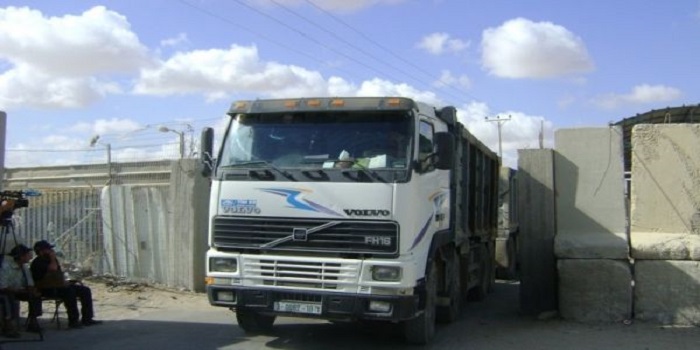Products of Five Palestinian Companies Banned from Entering Jerusalem

Hasnaa Al-Rantisy – Palestine Economy Portal
Translated by Tamara Barakat
Al-Sous told the Palestine Economy Portal that a similar measure was taken in 2010 when Israel tried to prohibit the entry of Palestinian products into Jerusalem. However, due to pressure placed on Israel by certain individuals, international parties, the Quartet and the US administration, it was forced to go back on its decision.
The Palestinian trucks carrying the products are currently waiting at the checkpoint. The banned products include dairy products produced by Al-Hamoda, Al-Juneidi Al-Rayan Companies, and meat products produced by Al-Salwa and Siniora Companies.
Al-Sous expressed his worry over the potential economic losses amounting to millions of shekels that might be incurred by the company if the decision is implemented, as Jerusalem’s market share of Al-Hamoda Company’s sales comprises 50%.
He also affirmed that Al-Hamoda Company contacted the Palestinian Government through the Ministry of Social Affairs and the Ministry of Agriculture to find a solution for this crisis and to understand the details of and reasons behind this decision.
“We have been told that the crisis will be solved soon, but there are no guarantees for that,” he said.
The head of the Marketing Department at the Ministry of Agriculture, Tareq Abu Laban, said that this decision was unilateral. He explained that such measures have political and economic dimensions, and they started with the approval of a law by the Knesset that prohibits the entry of Palestinian products into Israel, which violates the Paris Protocol on Economic Relations. Also, the decision to ban the entry of Palestinian products into Jerusalem contravenes international norms since it assumes that Jerusalem is part of Israel. The purpose of this decision is to increase the pressure on the Palestinian economy, especially on its most important growing sector - the livestock sector. The Palestinian livestock sector requires great amounts of investment, and it witnessed remarkable development.
Abu Laban affirmed that the Palestinian side is officially “studying” the appropriate measures to be taken in response to such a decision, “but we hope that Israel will back down from this decision”
He also mentioned that the banned products’ market share in Jerusalem is high. However, it is hard to give an estimate of the market share since the companies either hide or do not provide such data to the Palestinian government.


